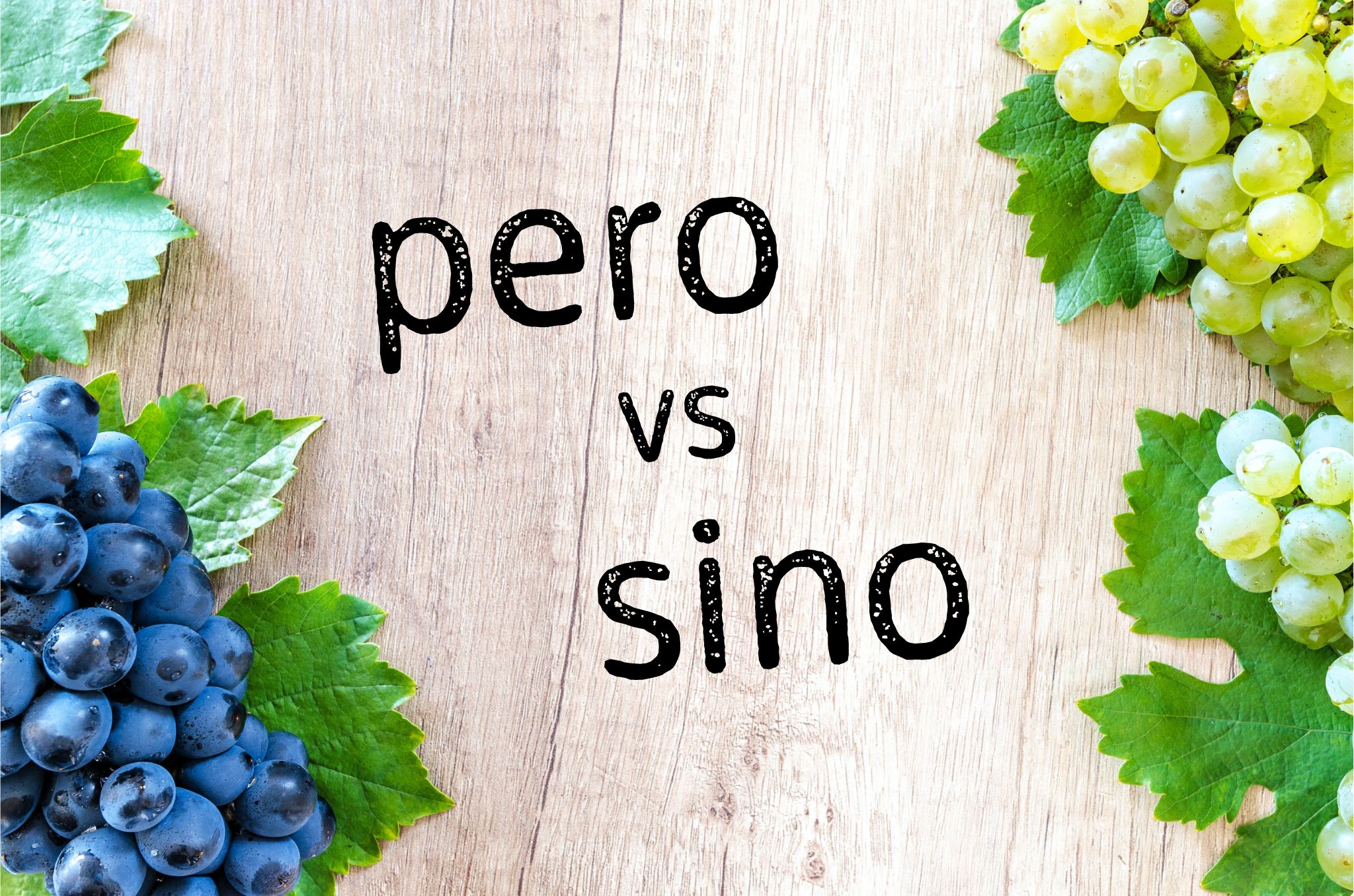Pero vs Sino in Spanish: Differences and Usages

Get our free email course, Shortcut to Conversational.
Have conversations faster, understand people when they speak fast, and other tested tips to learn faster.
More infoPero and sino are generally confused because both can be translated as but. However, they are not interchangeable as they’re used in different contexts and with different meanings.
In this post, we’ll take a closer look at pero vs sino, the meaning of each one, and how they’re each used.
Pero vs Sino
Pero and sino are both conjunctions. Conjunctions are words that help to connect other words and phrases, thereby creating a more fluent way of expressing ideas and having a smooth conversation.
Conjunctions such as pero and sino are used to express contrast or add information. For a broader explanation of different conjunctions, take a look at our post on Spanish conjunctions.
Sino
Sino can be translated as but, but rather, but on the contrary, or but instead. Generally, sino links a negative idea with another clause that contradicts or corrects it. Let’s see some examples of how to use sino in Spanish.
In the following sentences, sino is used to correct the preceding statement:
- The grapes are not ripe, but rather unripe. – Las uvas no están verdes sino maduras.
- The records are not CDs. On the contrary, they’re vinyls. – Los discos no son CD sino vinilos.
- This is not beer but rather wine. – Esto no es cerveza sino vino.
- Those kids are not from England, they’re rather from Germany. – Aquellos niños no son de Inglaterra sino de Alemania.
Here, sino is used to introduce contrasting ideas:
- I didn’t do it but rather Marcos did it. – Yo no lo hice, sino Marcos.
- This time it wasn’t my father who wrote that song but instead it was my grandpa. – Esta vez no fue mi papá el que escribió esa canción sino mi abuelo.
- The landscape was not beautiful; on the contrary, it was unpleasant. – El paisaje no era hermoso sino desagradable.
As you may have noticed, sino occurs after negations to introduce the contrasting idea. We also can find sino in questions but the meaning changes a bit. In these questions, sino has a meaning closer to except, other than, or but. Let’s see some examples:
- Who but me could love you like this? – ¿Quién sino yo podría amarte así?
- What else other than tequila goes in a margarita? – ¿Qué otra cosa sino tequila va en una margarita?
- How other than through practice can one learn Spanish? – ¿Cómo sino a través de la práctica se puede aprender español?
Sino que
Similarly to sino, sino que also contrasts with the information preceding it, but with the addition of que we can follow it with a conjugated verb. Have a look at these examples:
- Santiago will not go on vacation; he will have to work instead. – Santiago no irá de vacaciones sino que tendrá que trabajar.
- I didn’t call her, but rather she called me. – No la llamé yo sino que me llamó ella.
- What can I say except that I’m sorry? – ¿Qué puedo decir sino que lo siento?
No solo…sino que, No solo…sino también
These two constructions are the Spanish equivalent of not only…but or not only…but also. To use these expressions, we can include conjugated verbs in both of the clauses being compared. In the case of sino también, though, we can sometimes omit the second verb. In general, we use these structures to add information or really underline our point.
- Not only do I believe you, but I’m going to help you. – No solo le creo, sino que lo voy a ayudar.
- Not only do I love her, I want to spend the rest of my life with her. – No solo la quiero sino que quiero pasar el resto de mi vida con ella.
- Jorge speaks not only Spanish but also Italian. – Jorge no solo habla español sino también italiano.
No solo…sino que and no solo…sino también are part of a group of connectors regularly used in Spanish. To learn other options for different connecting words, take a look at our dedicated post on connectors in Spanish.
Sino vs Si no
Don’t mix up sino and si no, written as two separate words. Si means if, and no is the Spanish word to denote negation, so si no means if not.
Although they may appear similar, si no and sino are unrelated to each other!
Pero
Pero is different from sino in that it adds information, making a contrast with the previous information. Pero may also be translated into English as but, while it’s sometimes better translated as however or nevertheless. Let’s see some examples:
- Mario is handsome but not very intelligent. – Mario es guapo, pero no muy inteligente.
- I like to study but not that much. – Me gusta estudiar pero no tanto.
- We all went on vacation together, however, we didn’t enjoy it so much. – Nos fuimos de vacaciones todos juntos, pero no lo disfrutamos mucho.
- You didn’t buy me anything for our anniversary. Nevertheless, you cooked a yummy dinner. – No me compraste nada para nuestro aniversario, pero cocinaste una cena riquísima.
- I don’t want to go to the cinema, but I do want to go to the theatre. – No quiero ir al cine, pero sí quiero ir al teatro.
Pero can also be categorized as a transition word. For other options in this family of Spanish words, go ahead and check out our post on Spanish transition words.
Pero vs Sino: Pro tips
Here we leave you a list of tips and examples that will make your life easier when you’re unsure whether to use pero vs sino. Based on these situations, you should be able to decide which conjunction to use:
First statement positive: Pero
- I want to go to the concert, but the tickets are very expensive. – Quiero ir al concierto, pero la entrada es muy cara.
Note that you may also use pero with a negative statement, but you can definitely not use sino after a positive statement.
First statement negative: Sino
- We don’t have a dog, but rather many cats. – No tenemos un perro, sino muchos gatos.
You may also use pero after a negative statement with a clear contrasting idea.
- I don’t want to go to the concert but I do want to go to the night club. – No quiero ir al concierto, pero sí quiero ir a la discoteca.
First statement negative, with conjugated verbs in both statements: Sino que
- We did not travel to Spain by plane, we went by train instead. – No viajamos a España en avión sino que fuimos en tren.
You can replace But with However: Pero
- The movie had very good reviews, but it was very long. – The movie had very good reviews, however it was very long. – La película tuvo buenas críticas pero fue muy larga.
You can replace But with On the contrary: Sino
- It wasn’t a bad book, [but] it was an excellent one. – It wasn’t a bad book. On the contrary, it was an excellent one. – No fue un mal libro, sino uno excelente.
Conclusion
So far so good! We hope that you have the various uses for sino vs pero straight now, since we’ve gone through their different contexts and meanings.
We not only covered “sino” on its own, we also looked at its other constructions of “sino que” and “no solo…sino que” or “no solo…sino también.” – No solo cubrimos el “sino”, sino también analizamos sus otras construcciones como “sino que” y “no solo…sino que” o “no solo…sino también.”
In general, sino is used to contrast and also to correct ideas, while pero is used to contrast and also to add information.
To end this post on pero vs sino, we’ll leave you with a set of exercises for you to practice what you’ve just learned!
Exercises
Complete the sentences with pero, sino, or sino que.
1. No me gustan las naranjas, _____ sí me gustan las manzanas.
2. Quiero comer lasaña, _____ no quiero comer acá.
3. Ella no es vegetariana, _____ vegana.
4. No tengo 8 gatos, _____ tengo 8 loros.
5. Queremos ir de vacaciones, _____ no queremos viajar en avión.
6. Me duele la panza, _____ me voy a terminar esa hamburguesa.
7. No le compré el celular nuevo, _____ se lo compró su tío.
Answers
1. No me gustan las naranjas, pero sí me gustan las manzanas. – I don’t like oranges, however, I do like apples. (Note that, from a grammatical perspective, sino que sí could also work here. However, pero sí is more commonly used to express contrast than sino que sí.)
2. Quiero comer lasaña, pero no quiero comer acá. – I want to eat lasagna but I don’t want to eat here.
3. Ella no es vegetariana, sino vegana. – She is not vegetarian, but rather vegan.
4. No tengo 8 gatos, sino que tengo 8 loros. – I don’t have 8 cats, but rather 8 parrots.
5. Queremos ir de vacaciones, pero no queremos viajar en avión. – We want to go on vacation, but we don’t want to travel by plane.
6. Me duele la panza, pero me voy a terminar esa hamburguesa. – I have a stomach ache. However I’m going to finish up that hamburger.
7. No le compré el celular nuevo, sino que se lo compró su tío. – I didn’t buy her the new cellphone, but rather her uncle did.



